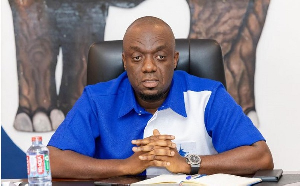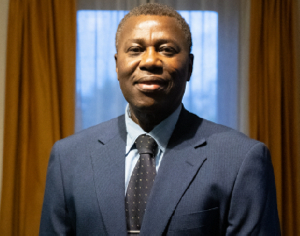By Kwame Okoampa-Ahoofe, Jr., Ph.D.
The fact of the chief of the Okyeman township of Nkwantanang's winning of a destoolment case against him by the Okyenhene (we have now learned that the lawsuit was actually launched by the people and a section of the kingmakers of the twonship) in the Koforidua High Court, does not render the Okyenhene the loser. It merely underscores what some of us avid students of the traditional Akan system of governance have maintained all along - that our precolonial Constitutional Monarchy has an inbuilt democratic mechanism that readily trumps our British-inherited current system of governance (See "Nkwantanang Chief Floors Okyenhene In Court" Graphic Online / Ghanaweb.com 3/18/14).
This, of course, is absolutely in no way to suggest that our current judicial dispensation is without any remarkably redeeming features. For in this particular instance, it is glaringly clear that had the legitimately constituted High Court not stepped in and opportunely so, Okyeman would be unnecessarily saddled with another wasteful battle/contest of wills which would not redound to the benefit of anybody.
Still, what the Graphic Online news-story flagrantly overlooks is the fact that the decision by both the Okyenhene and the Okyeman Traditional Council to destool Barima Adanse Akyem Omane I, as the legitimate and substantive chief of Nkwantanang, was not gratuitously predicated on a vacuum. It may well have something to do with any number of reasons, ranging from the Nkwantanang chief's arbitrary and abusive exercise of power and an abject lack of visionary and progressive leadership. This is clearly what does not appear to have featured or constitutued an integral part of the ruling by Justice Kossi Efo Kaglo.
It is also rather absurd for the Nkwantananghene, or chief, to assert that short of his demise, no regent or chiefly successor can be named. The fact of the matter is that Akan Constitutional Monarchy has provisions allowing for the destolment of any chief, irrespective of status or stature, for any number of reasons, including non-performance of his sworn duties and immoral conduct. From the Graphic Online news-story, we do not know precisely what motivated the Okyenhene, Osagyefo Amoatia Ofori-Panyin II, and the Okyeman Traditional Council, to seek the destoolment of Barima Akyem Omane I. What I am clearly suggesting here is that the battle may well have just begun.
We also don't know who these Kingmakers of the Nkwantanang royal family are; but we do know that absolutely no court of the land, including the Ghana Supreme Court, can force the Okyenhene and the Okyeman Traditional Council to recognize the Nkwantananghene - or chieftain - outside the territorial limits of his township. What the latter observation means is that the safety of Barima Adanse Akyem Omane cannot be guaranteed by Okyeman outside the township limits of Nkwantanang.
What this further means is that unless, and until, he comes to some sort of workable agreement with the other several hundred legitimately invested chiefs of Akyem-Abuakwa, the Nkwantananghene risks effective isolation for as long as he occupies the Nkwantanang stool. Ultimately, even as Justice Kaglo clearly articulated in his ruling, the Kingmakers and people of Nkwantanang are the ones constitutionally vested with the power to decide whether Barima Omane can continue to hold himself out as their sole and legitimate representative, not merely because he is a bona fide member of the Nkwantanang royal family, but primarily because his vision and leadership skills and capacity are in synch with their best interests and aspirations.
______________________________________________________________
*Kwame Okoampa-Ahoofe, Jr., Ph.D.
Department of English
Nassau Community College of SUNY
Garden City, New York
March 19, 2014
E-mail: okoampaahoofe@optimum.net
###
Opinions of Sunday, 6 April 2014
Columnist: Okoampa-Ahoofe, Kwame














